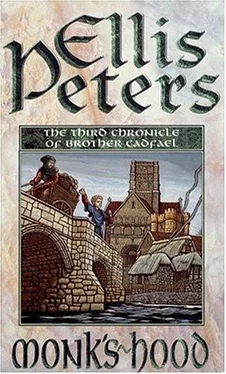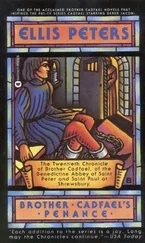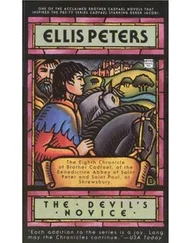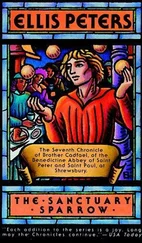The shudder and murmur that rippled through the church caused even the dark timber walls to quiver. The three on the bench stirred and peered, but kept their more than human balance and calm. The president said with the same restraint: “We must and will hear whoever comes with an urgent plea, however proffered, with or without legal advice, but the cause may involve adjournment for proper procedure. On that consideration, you may speak.”
“Then first, as to the land of Mallilie, here with me are four respected men, known to all here, who hold land bordering the manor, and their boundaries between them encircle nine-tenths of the manor lands. Only the remaining tenth touches English soil. And all is on the Welsh side of the dyke, as all men know. I ask my witnesses to speak for me.”
The oldest said simply: “The manor of Mallilie is within the land of Wales, and causes within it and concerning it have been tried by Welsh law within my lifetime, on two occasions, even though the manor was in English hands. True it is that some cases have also been heard in English court and by English law, but Gervase Bonel himself twice preferred to plead in this court and by Welsh law. I hold that Welsh law has never lost its right in any part of that land, for whatever its ownership, it is part of the commote of Cynllaith.”
“And we hold the same opinion,” said the second of the elders.
“That is the view of you all?” asked the judge.
“It is.”
“Is there any present here who wishes to refute that opinion?”
There were several, on the contrary, who spoke up in confirmation of it, one indeed who recalled that he had been the party in dispute with Bonel on the last occasion, over a matter of cattle straying, and had had his case heard in this court, by a bench on which one of the present judges had sat with two others. As doubtless the judge in question recalled without need of reminders.
“The bench is in agreement with the witness of neighbours,” said the president, having consulted his colleagues with hardly more than a glance and a nod.” There is no question that the land involved is within Wales, and any plaintiff advancing a claim on it is entitled to Welsh law if he desires it. Proceed!”
“As to the second matter of substance,” said Meurig, moistening lips dry with tension, “I declare that I am the son of Gervase Bonel, his only son, his only child. And I ask these who have known me from birth to testify to my parentage, and any here who may also know the truth to speak up in support of me.”
This time there were many in the body of the church who rose in turn to confirm the declaration of the elders: Meurig, son of Angharad, daughter of Ifor ap Morgan, had been born on the manor of Mallilie, where his mother was a maidservant, and it had been known to everyone before his birth that she was with child by her lord. It had never been any secret, and Bonel had housed and fed the boy.
“There is a difficulty here,” said the presiding judge. “It is not enough that the common opinion should be that a certain man is father, for common opinion could be mistaken. Even the acceptance of the duty of providing for a child is not in itself proof of acknowledgement. It must be shown that the father has himself acknowledged the child as his. That is the validation the kinship requires for the admittance of a young man into full rights, and that is the validation necessary before property can be inherited.”
“It is no difficulty,” said Meurig proudly, and drew out from the bosom of his cotte a rolled parchment. “If the court will examine this, they will see that in this indenture, when I took up a trade, Gervase Bonel himself called me his son, and set his seal to it.” He came forward and handed up the parchment to the judges’ clerk, who unrolled and studied it.
“It is as he says. This is an agreement between Martin Bellecote, master-carpenter, of Shrewsbury, and Gervase Bonel, for the young man Meurig to be taken and taught the whole craft of the carpenter and carver. A payment was made with him, and a small allowance made to him for his keep. The seal is in order, the young man is described as ‘my son.’ There is no doubt in the matter. He was acknowledged.”
Meurig drew breath deep, and stood waiting. The bench conferred in low and earnest tones.
“We are agreed,” said the president, “that the proof is irrefutable, that you are what you purport to be, and have the right to make claim upon the land. But it’s known that there was an agreement, never completed, to hand over the manor to the abbey of Shrewsbury, and on that ground, before the man’s unfortunate death, the abbey placed a steward in the house to administer the estate. A claim by a son, in these circumstances, must be overwhelmingly strong, but in view of the complications it should be advanced through the channels of law. There is an English overlord to be taken into account, as well as such claims as the abbey may advance, by virtue of Bonel’s having shown his intent even in an uncompleted agreement. You will have to bring formal suit for possession, and we would advise that you brief a man of law at once.”
“With respect,” said Meurig, paler and brighter than ever, and with hands cupped and curled at his sides, as if he had already filled them with the desired and coveted soil, “there is a provision in Welsh law by which I may take possession even now, before the case is tried. Only the son may do so, but I am the son of this man who is dead. I claim the right of dadanhudd, the right to uncover my father’s hearth. Give me the sanction of this court, and I will go, with these elders who uphold my claim, and enter the house which is mine by right.”
Brother Cadfael was so caught into the intensity of this consuming passion that he almost let the just moment slip by him. All his Welsh blood rose in helpless sympathy with so strong a hunger and love for the land, which Meurig’s blood would have granted him, but by Norman-English law his birth had denied him. There was almost a nobility about him in this hour, and the bleak force of his longing carried with him judges, witnesses, even Cadfael.
“It is the court’s judgment that your claim is justified,” said the president gravely, “and your right to enter the house cannot be denied you. For form’s sake we must put it to this assembly, since no notice has been given beforehand. If there is any here who has anything to raise an objection, let him stand forward now, and speak.”
“Yes,” said Cadfael, wrenching himself out of his daze with a great effort. “Here is one who has somewhat to say before this sanction is granted. There is an impediment.”
Every head turned to peer and crane and stare. The judges ranged the ranks looking for the source of the voice, for Cadfael was no taller than the majority of his fellow-countrymen, and even his tonsure could be matched by many here conferred by time rather than a cloistered order. Meurig’s head had turned with a wild start, his face suddenly fixed and bloodless, his eyes blank. The voice had pierced him like a knife, but he did not recognise it, and for the moment was too blind to be able to mark even the undulation of movement as Cadfael pushed his way clear of the crowd to be seen.
“You are of the Benedictine order?” said the presiding judge, bewildered, as the sturdy, habited figure emerged and stood in the aisle. “A monk of Shrewsbury? Are you here to speak on behalf of your abbey?”
“No,” said Brother Cadfael. He stood no more than two yards from Meurig now, and the mist of shock and unbelief had cleared from the black, brilliant eyes; they recognised him all too well. “No, I am here to speak on behalf of Gervase Bonel.”
By the brief, contorted struggle of Meurig’s throat, he made an attempt to speak, but could not.
Читать дальше












